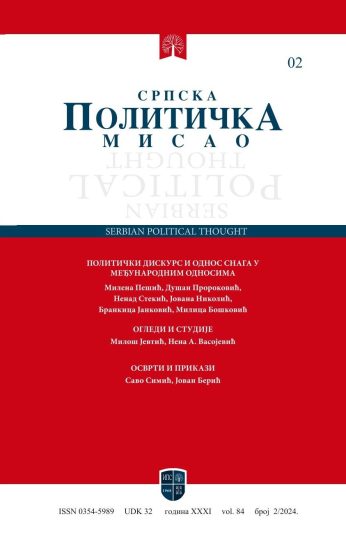Тема броја
ОГЛЕДИ И СТУДИЈЕ
НЕФОРМАЛНИ ОБЛИЦИ ДРУШТВЕНЕ АНОМИЈЕ
Сажетак
Тема овог научног рада смештена је у домен друштвене аномије. Ефекти деловања појавних облика друштвене аномије изазивају друштвену ентропију и указују на трајну актуелност теме. Друштвена аномија разара друштвене процесе, обезвређује институције и девастира темељне вредности на којима почива заједница, па је Друштвени значај истраживања неупитан. Научна оправданост садржана је у потреби да се појаве и процеси из домена друштвене патологије расветле. Циљ истраживања је да се посматране појаве: дефинишу, класификују, систематизују и да се понуде оптимална решења за њихово превазилажење. Рад за Предмет истраживања има: откривање и дефинисање појавних облика друштвене аномије, указивање на штетност деловања ових неформалних oблика друштвеног понашања, као и давање предлога решења за превазилажење настале ситуације како би се штетна деловања отклонила. Аутори у раду полазе од: метода посматрања, анализе садржаја, развојног метода, упоредног приступа, метода унакрсних култура те низа метода из правних наука. Предметни оквир истраживања креће се у простору: социологије, социјалне патологије, политичких и правних наука.
Референце
- Ackerman, Susan Rose, and Bonie Palifika. 2016. Corruption and Government – Causes, Consequeces and Reform. Second Edition. New York: Cambridge University Press.
- Aristotel. 1988. Fizika. Zagreb: Globus, Sveučilišna naklada Liber.
- Çarikçi İlker Hüseyin, Ahmet Sait Özkul, Aygen Demir Oksay, and Hasan Hüseyin Uzunbacak. 2009. “Favoritism and Nepotism in The Ottoman Empire.” International Symposium on Sustainable Development, 498–504. https://core.ac.uk/download/pdf/153447043.pdf.
- Dohrenwend, Bruce. 1959. “Egoism, Altruism, Anomie, and Fatalism – A Conceptual Analysis of Durkheim’s Types.” American Sociological Review 24 (4): 466–473.
- Durkheim, David Émille. 1897. Le Suicide. Paris: Félix Alcan Éditeur.
- Ellwood, Charles. 1916. “Objectivism in Sociology.” American Journal of Sociology 22 (3): 289–305.
- Fazekas, Mihály. 2017. “Red tape, bribery and government favouritism: evidence from Europe.” Crime, Law and Social Change 68: 403–429.
- Heidenheimer, Arnold, Michael Johnston. 2011. Political Corruption – Concepts and Contexts. New Jersey: Transaction Publishers.
- Hilbert, Richard. 1989. “Durkheim and Merton on Anomie – An Unexplored Contrast and Its Derivatives.” Social Problems 36 (3): 242–250.
- Holmes, Leslie. 2015. Corruption – a very short Introduction. Oxford: Oxford University Press.
- Hookway, Nicholas. 2014. “Moral decline sociology – Critiquing the legacy of Durkheim.” Journal of Sociology XX(X): 1–14.
- Im Hohjin, and Chen Chuansheng. 2020. “Cultural dimensions as correlates of favoritism and the mediating role of trust.” Cross Cultural & Strategic Management 27 (3): 417‒445.
- Jones, Douglas. 2022. “Clientelism and its discontents: The role of wasta in shaping political attitudes and participation in Jordan.” Mediterranean Politics. doi: 10.1080/13629395.2022.2114064.
- Jones, Robert. 2013. Nepotism in Organizations. New Yourk: Routledge, Taylor and Francis Group.
- Krippendorff, Klaus. 1986. A Dictionary of Cybernetics. Philadelphia: University of Pennsylvania.
- Martz, John. 1997. The Politics of Clientelism: Democracy and the State in Colombia. New Jersey: Transaction Publishers.
- Merton, Robert. 1938. “Social Structure and Anomie.” American Sociological Review 3 (5): 672–682. doi.org/10.2307/2084686.
- Merton, Robert. 1949. Social Theory and Social Structure. New York: Free Press.
- Müller, Hans-Peter. 2013. “Société, morale et individualisme – La théorie morale d’Emile Durkheim.” Trivium 13. doi.org/10.4000/trivium.4490.
- Perić Diligenski, Tijana. 2018. „Koruptivno u srpskoj političkoj kulturi.” U Identitet, politička kultura, institucije, knjiga 7, ur. Vladan Stanković, 101–117. Beograd: Institut za političke studije.
- Piras, Mauro. 2004. “Les fondements sociaux de l’agir normatif chez Durkheim et Weber – le rôle du sacré.” Archives de Sciences Sociales des Religions 27 (3): 139–166.
- Prenzler, Tim. 2021. “Grey corruption issues in the public sector“. Journal of Criminological Research, Policy and Practice 7 (2): 137–149. doi.org/10.1108/JCRPP-02-2020-0021.
- Stanković, Vladan. 2018. „Srpski identitet, politička kultura i odnos prema institucijama.” U Identitet, politička kultura, institucije, knjiga 7, ur. Vladan Stanković, 119–139. Beograd: Institut za političke studije.
- Stein, Howard. 1984. “A Note on Patron-Client Theory.” Ethos 12 (1): 30–36. doi.org/10.1525/eth.1984.12.1.02a00020.
- Szakonyi, David. 2019. “Princelings in the Private Sector: The Value of Nepotism.” Quarterly Journal of Political Science 14 (4): 349–381. doi:10.1561/100.00018087.
- Wodarski, John, and Sophia Dziegielewski. 2002. Human Behavior and the Social Environment – Integrating Theory and Evidence-Based Practice. New York: Springer.
- Zindović Ilija, i Vladan Stanković. 2012. „Legalizovani oblici korupcije u Srbiji – anomična stanja društvene entropije.” Sociološki pregled XLVI (1): 17–34. doi: 10.5937/socpreg1201017Z.



